WOC 405
Page 405

Improving Your Vocabulary
When you think, you tend to use words. That means, the more words you know, the more you can think. Improving your vocabulary is one of the most powerful ways to improve your mind.
You can improve your vocabulary just by reading. When you come across a new word, use context clues to understand its meaning.
You can also learn new words by breaking them down into prefixes, suffixes, and roots. Each word part carries a different meaning, adding up to the whole.
This chapter teaches many ways to improve your all-important vocabulary.
What’s Ahead
WOC 406
Page 406
Using Context
When you come across a word you don’t know, you can often figure out its meaning from the other words in the sentence or sentences around it. The other words form a familiar context or setting, for the unfamiliar word. Looking closely at these surrounding words will give you hints, or clues, about the meaning of the new word. Seven common types of context clues are listed below with examples. (Unfamiliar words are shown in red, context cues in blue.)
You can get additional practice with context clues by downloading this activity.
Types of Context Clues
■ Clues from synonyms:
Sara had an ominous feeling when she woke up, but she felt less anxious when she saw she was in her own room.
■ Clues from antonyms:
Boniface had always been quite heavy, but he looked gaunt when he returned from the hospital.
■ Clues contained in comparisons and contrasts:
Riding a mountain bike in a remote area is my idea of a great day. I wonder why some people like to ride motorcycles on busy six-lane highways.
■ Clues contained in a definition or description:
Manatees, large aquatic mammals (sometimes called sea cows), can be found in the warm coastal waters of Florida.
■ Clues that appear in a series:
The campers spotted sparrows, chickadees, cardinals, and indigo buntings on Saturday morning.
■ Clues provided by the tone and setting:
Mom lined us up in the living room—combing our hair, straightening our ties, flicking lint off our suits. “But, Mom, it’s just Dad,” I complained. She shook her head gravely. “He’s not just Dad. He’s Lieutenant Charles, back from Iraq. This is an auspicious day.”
■ Clues derived from cause and effect:
The amount of traffic at 6th and Main doubled last year, so stoplights were placed at that corner to avert an accident.
WOC 407
Page 407
Context Clues in Action
The following passage comes from Jack London’s Call of the Wild, a novel about a team of sled dogs in Alaska during the Gold Rush. Note the unfamiliar words in red. Use synonyms, antonyms, tone, setting, and other context clues to write a definition for each word in red. Compare your definitions with a classmate’s, and then check your definitions against those below.
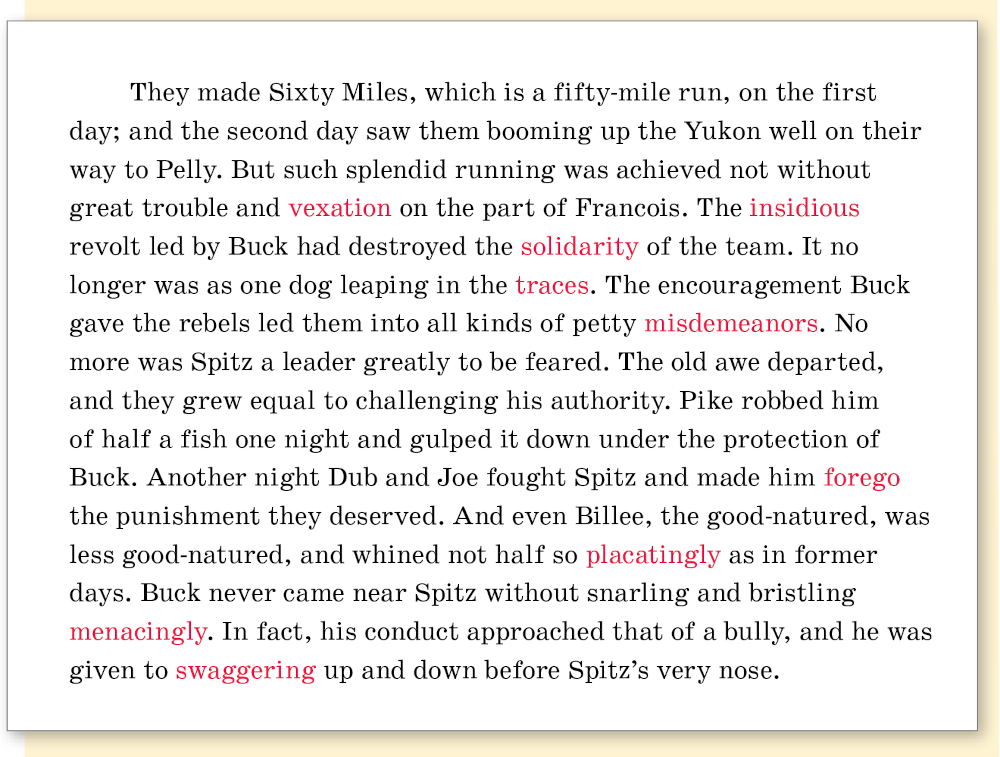
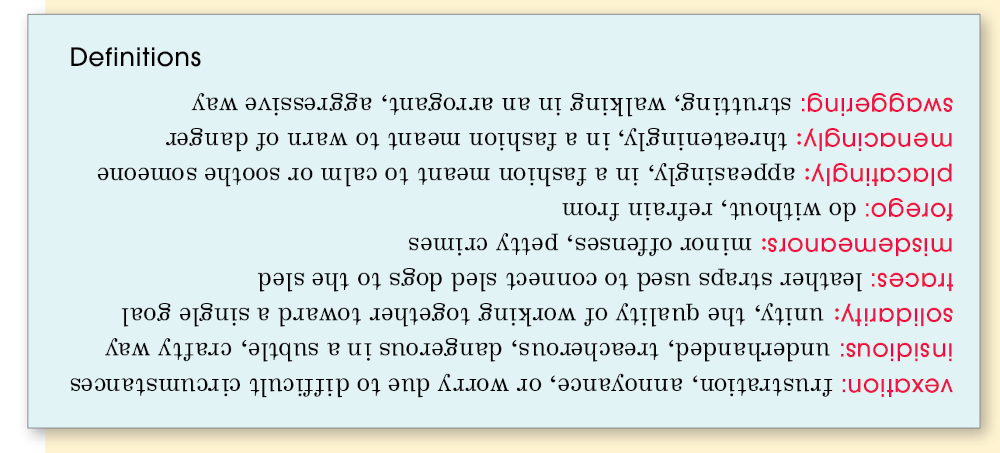
WOC 408
Page 408
Checking a Dictionary
The dictionary is, of course, your most reliable source for learning the meanings of new words. The dictionary also offers the following aids and information:
Guide words are words located at the top of every page. They list the first and last entry words on a page, and they help you know which words fall in alphabetical order between the entry words.
Entry words are the bold words that are defined on the dictionary page. Entry words are listed in alphabetical order.
Synonyms mean the same thing. Antonyms mean the opposite.
Syllable divisions show where you can divide a word into syllables. Some dictionaries use heavy black dots to divide the syllables. Other dictionaries put extra space between syllables.
Spelling and capitalization (if appropriate) are given for every entry word. If an entry is capitalized, capitalize it in your writing, too.
Etymology gives the history of a word [in brackets]. Knowing a little about its history can make a word easier to remember.
Parts of speech labels tell you the different ways a word can be used. For example, the word muse can be used as a noun (My muse helped me write the poem) or as a verb (I mused on the meaning of life).
Usage labels tell if a word is formal, informal, slang, or archaic.
Accent marks show which syllable or syllables should be stressed when you say a word.
Pronunciation key gives symbols to help you pronounce the entry words.
Illustrations are often provided to make the definition clearer.
Helpful Hint
Remember: A word often has more than one meaning, so read them all. This will give you the best chance of using the word correctly.
WOC 409
Page 409
Sample Dictionary Page
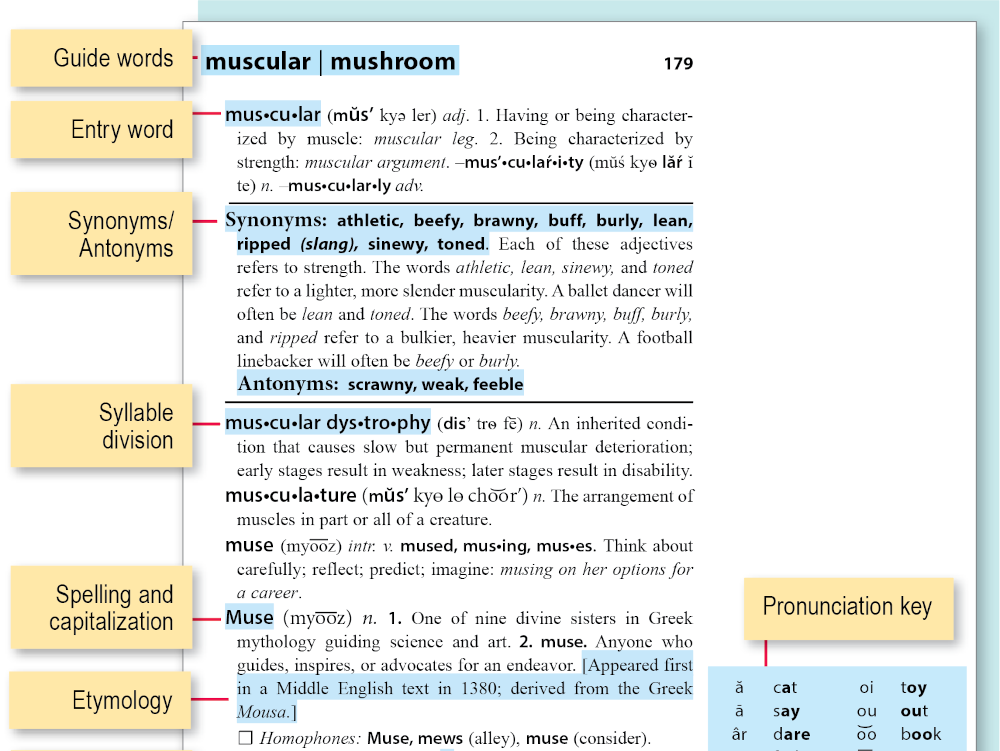
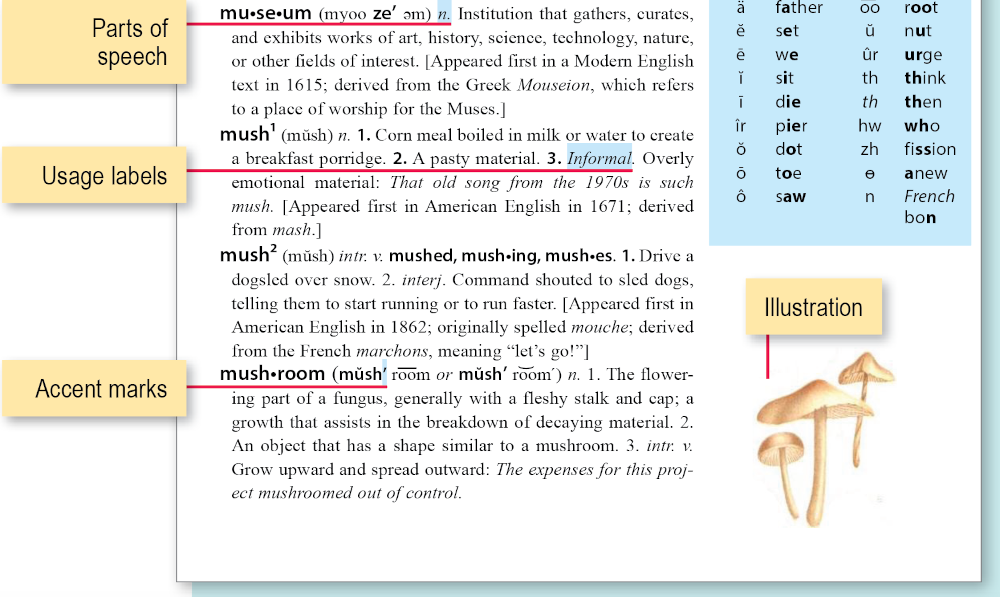
WOC 410
Page 410
Referring to a Thesaurus
A thesaurus is a reference book that gives synonyms and antonyms for words. A thesaurus helps you in two ways:
- It helps you find just the right word for your writing.
- It keeps you from using the same words again and again.
- If a thesaurus is organized alphabetically, look up the word as you would in a regular dictionary. If you have a traditional thesaurus, look for your word in the book’s index.
Finding the Best Word
A thesaurus would be helpful if you needed one effective word to mean laugh suddenly in the following sentence.
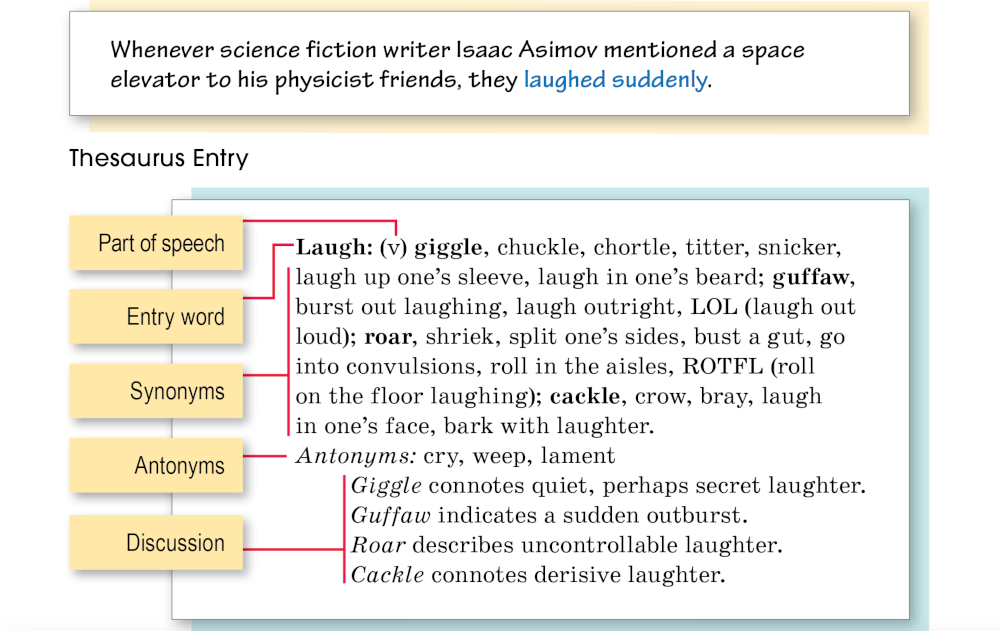
After reading the list of synonyms, you decide on guffawed because it fits best.

You can get additional practice by downloading this thesaurus activity.
WOC 411
Page 411
Understanding Word Parts
Many words in our language are made up of different word parts—prefixes, roots, and suffixes. Often these word parts come from ancient languages, including Latin, Greek, Old French, and Old English. Learning how words are put together will help you better understand the language. (See pages 412–416 for common word parts.)
Example Words
These two examples show you how combinations of word parts create words in the language.
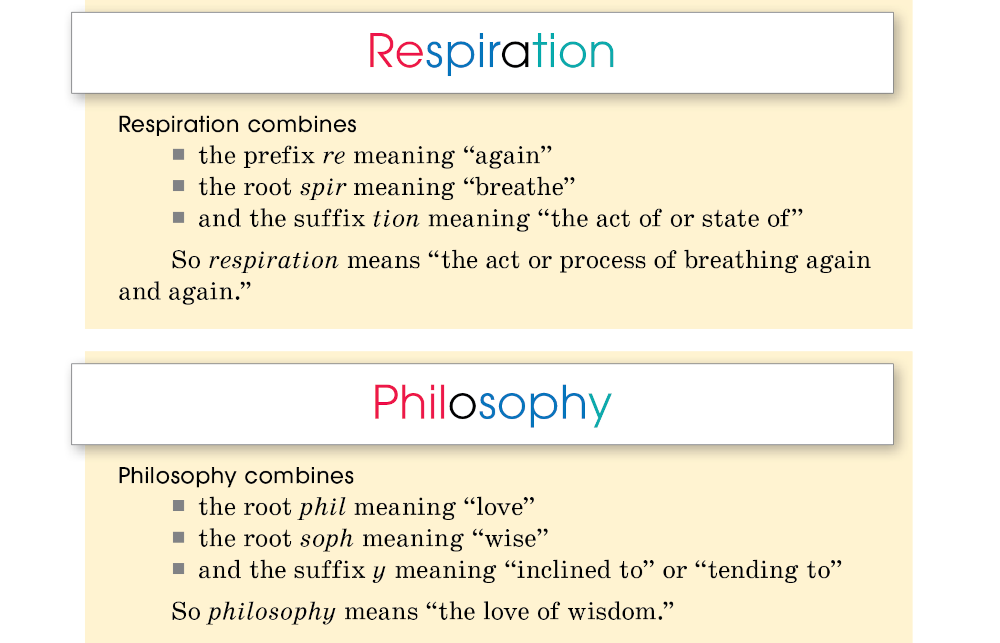
Helpful Hint
Many words in our language are root words themselves. For example, a word such as nose is not made up of other word parts. These words can be combined with other base words to form a word such as nosebleed, or they can be combined with other word parts, like the suffix y, to form a word such as nosy.
WOC 412
Page 412
Common Prefixes, Roots, and Suffixes
The next five pages list common prefixes, roots, and suffixes. When you are not sure of a new word, try to figure out its meaning by studying its parts.
Prefixes
Prefixes come before roots, or base words, to form new words. A list of common prefixes follows.
ambi, amphi (both) amphibious (on both land and sea)
ante (earlier) antedate (to be of an earlier date)
anti (against) antibiotic (a substance fighting against disease)
astro (star) astronomer (studier of the stars and planets)
auto (self) autocrat (ruler with unlimited self-rule)
bi (two) bisect (to cut into two parts)
circum (around) circumvent (to avoid or get around something)
dia (through, across) diameter (a straight line passing through the center of a circle)
epi (upon, above, outer) epicenter (the point where an earthquake is centered)
ex (out) excavate (to dig or hollow out)
extra (outside, beyond) extrasensory (outside the normal range of the senses)
fore (before, earlier) foresee (to see or know before)
hemi (half) hemisphere (half of a sphere or half of the human brain)
hyper (over) hypercritical (overly critical)
in, im (not) improbable (not probable)
inter (between) interstate (connecting or between two states)
intra (within) intranet (a network within the private control of a person)
macro (large) macroclimate (the climate of a large area)
mal (bad, poorly, or wrongly) malformed (poorly formed)
micro (small) microcircuit (a very small circuit)
mono (one) monopoly (control by one group)
non (not) nonflammable (not easily set on fire)
over (above, more, or too much) overcharge (to charge too much for something)
poly (many) polygraph (an instrument measuring many body actions)
post (after) postwar (a period of time after a war)
pre (before) predict (to make known before or in advance)
re (again, back) readjust (to adjust again)
semi (half or occurring twice) semiautomatic (partly automatic), semimonthly (occurring twice a month)
sub (under) subway (an underground railroad)
trans (across, beyond) transatlantic (crossing the Atlantic Ocean)
tri (three) triad (a group of three)
un (not) unreal (not real)
under (below) undercurrent (a current beneath a surface)
uni (one) unicellular (having one cell)
WOC 413
Page 413
Roots
Roots serve as the starting point for most words. A list of common root words follows.
alter (other) alternative (a different choice)
anni, annu, enni (year) anniversary (yearly event), annual (once a year), biennial (lasting two years)
anthrop (human being) anthropologist (someone who studies the development of humans)
aster (star) asteroids (irregularly shaped bodies orbiting the sun)
aud (hear, listen) audiology (the study of hearing)
bibl (book) bibliography (list of books)
bio (life) biosphere (the part of earth in which living things exist)
chrom (color) chromatic (of or relating to colors)
chron (time) chronology (the science dealing with the order of events)
cise (cut) incise (to cut into or mark)
claim (cry out) proclaim (to announce or declare)
cor, card (heart) cardiac (relating to the heart)
corp (body) corporation (relating to a business group or body)
cosm (universe, world) microcosm (a miniature world)
cred (believe) incredible (unbelievable)
cycl, cyclo (wheel, circular) cyclical (occurring in cycles), cyclone (strong circular wind)
dem (people) epidemic (an outbreak of a disease spreading among the people)
dent (tooth) dentist (a person trained to work on teeth)
derm (skin) epidermis (outer layer of skin)
dic, dict (say, speak) dictate (to say or read aloud to be recorded or written by another), contradict (to speak against)
dynam (power) dynamic (marked by intensity and power)
equi (equal) equilateral (having all sides equal)
fact (do, make) manufacture (to make things)
fin (end, ended, finished) final (occurring at the end)
flex (bend) reflex (bending back)
flu (flowing) fluid (a substance that flows easily)
fort, forc (strong) fortify (make strong), forceful (strong, full of force)
fract, frag (break) fragile (easy to break), fracture (a break)
gen (birth, produce) genetics (study of birth traits)
geo (earth) geology (study of the structure of the earth)
grad (step, go) gradual (step by step)
graph (write, written) autograph (a person’s own signature)
greg (group, herd) congregate (to come together in a group)
hab, habit (live) habitat (the area in which animals or plants live)
hetero (different) heterogeneous (consisting of parts that are not alike)
homo (same) homogeneous (of the same or similar kind)
hum (earth) humus (earth or dirt)
hydr, hydro, hydra (water) hydroelectric (generating electricity using water), hydrant (an upright pipe fitted with a valve to draw water)
ject (throw) eject (to throw out or force out)
leg (law) legislator (a member of a government body that makes laws)
WOC 414
Page 414
liber (free) liberation (the process of setting free)
log (word, study, speech) logic (the study of thinking and reasoning)
lum (light) illuminate (to provide with lights)
magn (great) magnify (to make something appear larger)
man (hand) manacle (handcuffs)
mania (insanity) pyromania (crazy urge to start fires)
medi (middle, between) median (located in the middle)
mega (great) megabit (one million bits)
mem (remember) memorial (something that serves as a remembrance)
meter (measure) thermometer (an instrument that measures temperatures)
migra (wander) migrant (a person who travels for work)
mit, miss (send) transmit (send across), missile (suited for launching or sending off)
mob, mot (move) mobilize (to move or gather together), promotion (moved ahead or advanced)
mort (mortal, death) mortal (subject to death)
nat (to be born) native (belonging to by birth or origin)
neur (nerve) neurology (study of the nervous system)
nov (new) novice (a person new to an activity)
numer (number) numeral (a symbol or mark representing a number)
omni (all, completely) omnipotent (all-powerful), omnivore (an organism that eats both plants and animals)
onym (name) synonym (a word having the same meaning as another word)
pac (peace) pacifist (a person who believes in peace)
pater, patr (father) patriarch (father and head of family or clan), paternal (characteristic of a father)
ped (foot) pedestrian (foot traveler)
pend (hang, weigh) pendant (a hanging ornament, often linked to a necklace)
phil (love) philosophy (love of wisdom)
phobia (fear) arachnophobia (fear of spiders)
phon (sound) telephone (an instrument that sends sounds)
photo (light) photoelectric (electrical effects caused by light)
pop (people) populate (to supply with people)
port (carry) portable (easy to carry)
proto (first) prototype (an original or first example of something)
psych (mind, soul) psychology (the study of mental processes)
rupt (break) interrupt (to break into a conversation)
sci (know) scientist (someone who is an expert in a scientific field)
scope (see, watch) microscope (an instrument that magnifies objects)
scrib, script (write) scribble (to write in a rush), inscription (the act of writing, printing, or carving on a surface)
sen (old) senior (older person)
sequ, secu (follow) sequence (following of one thing after another), consecutive (following in order)
soph (wise) sophisticated (having acquired more knowledge or refinement)
spect (look) inspect (to examine carefully)
sphere (ball) hemisphere (half of the earth)
spir (breath) respiration (the act or process of breathing)
strict (tighten) constrict (draw tightly together)
tag (touch) contagious (transmitted by contact)
tele (far) telephone (an instrument that sends sounds far away)
WOC 415
Page 415
tempo (time) temporary (bound by time)
tend, tens (stretch, strain) extend (to make longer), tensile (relating to or capable of being stretched)
terra (earth) terrain (an area of land)
therm (heat) thermal (of or relating to producing heat)
tom (cut) anatomy (the dissection or cutting of a plant or an animal for study)
tox (poison) antitoxin (acting against a poison)
tract (draw, pull) attract (to cause to draw near)
typ (print) typography (the arrangement and appearance of printed material)
vac (empty) evacuate (to remove or make empty)
vert, vers (turn) reverse (turn back), introvert (turn inward)
vid, vis (see) video (visual parts of television), visible (possible to see)
viv (alive, life) survive (to stay alive)
voc (call) invocation (the act of appealing or calling for help)
vor (eat greedily) herbivorous (plant-eating)
zo (animal) zoology (study of animal life)
Suffixes
Suffixes come after root words to form new words. A list of common suffixes follows.
able (capable of or able) movable (capable of being moved)
age (collection, act or result of) mileage (the collection or number of miles), slippage (the result of slipping)
al (of, relating to) seasonal (relating to the seasons)
an, ian (born into, of or relating to) African (born into Africa), Herculean (relating to Hercules)
ant (a person or thing performing an action) deodorant (something that performs or acts against odor)
ary, ery, ory (act of or relating to, connecting with) dictionary (relating to diction or word usage), bribery (the act of bribing)
ate (characterized by or to act upon) isolate (the act of setting apart)
cide (killer of) insecticide (a chemical killer of insects)
cy (state, condition, quality) bankruptcy (the state or condition of being bankrupt)
dom (condition, state) serfdom (the state of being a serf)
ee (a person who receives or benefits from) trainee (someone who benefits from training)
en (to cause to be or resembling) strengthen (to cause to be stronger), wooden (resembling wood)
ence (state of or quality) occurrence (the state of having occurred)
er, or (a person or thing that does something) teacher (someone who teaches), actor (someone who acts)
escent (beginning to or becoming) luminescent (becoming light)
ese (relating to a certain place) Chinese (relating to China)
ess (female) princess (female royalty)
fy, ify (to make or cause to become) simplify (to make simpler)
ful (full of) wonderful (full of wonder)
hood (condition or quality) falsehood (the condition or quality of being untrue)
WOC 416
Page 416
ic (relating to, having) atomic (relating to the atom)
ion, sion, tion (act of, result of) formation (the act of forming), precision (the result of being precise or exact)
ish (of or relating to) Swedish (of or being from Sweden)
ism (state of, characteristic, quality) criticism (state of being critical)
ist (one who) lobbyist (someone who lobbies the government)
ity (quality or condition) clarity (the quality of being clear)
ive (tending toward or becoming a certain act) disruptive (tending toward causing trouble)
less (without, lacking) nameless (without a name or an identity)
ling (a person connected with, something or someone that is small) earthling (someone connected with the earth), duckling (a small or young duck)
ly (having characteristics of, recurring, or in a specified manner) brotherly (having the characteristics of a brother), hourly (recurring on the hour)
ment (act of, state of) government (act of governing), amazement (state of being amazed)
ness (state, condition, quality) brightness (state of being bright)
ology (study of) hydrology (the scientific study of water)
osis (condition, process) tuberculosis (the condition of having tubercles or warty outgrowths)
ship (condition, quality of) companionship (the condition of being a companion or friend)
some (apt, like, leading to) twosome, lonesome, gruesome
ward (in a direction, toward) downward (toward a lower place)
y (inclined, tending to) messy (inclined to messiness)
Helpful Hint
Knowing that words can belong to a family of words can also help you build your vocabulary. For example, you may know that one definition of heart is “the ability to feel love, kindness, or sympathy” as in this sentence: Everyone loves my grandmother because she has a big heart. Then, when you come across words such as heartache, heartless, heartfelt, or heartwarming, you will have a good chance of figuring out their meanings because they are part of the same word family.